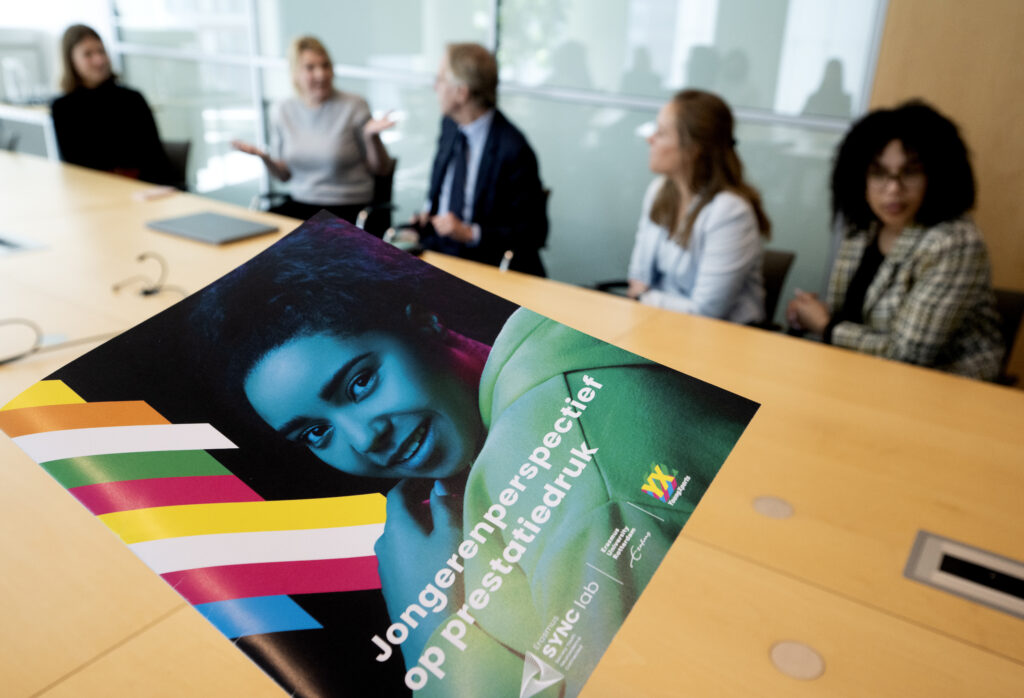Blog by Yara Toenders
The pressure to perform, like academic pressure, is a well-known term in the Netherlands. 1 out of 3 young people experience performance pressure, which can have negative effects on mental health [1-3]. Therefore, the YoungXperts team studied performance pressure in the Urban Rotterdam Study and in brainstorming sessions with young people. The results were presented in a webinar for teachers and policy-makers and a manifest, which was handed to the minister of education, culture, and science Robbert Dijkgraaf. The solution for performance pressure not only lies with young people themselves, but the systems and people around young people also play a role. Therefore, we combined knowledge from research (FACTS) with solutions that young people came up with in the brainstorming sessions (TAKE ACTION) to present a better future for young people.
Research shows that performance pressure has tripled over the past 20 years [4]. On average, young people rate the performance pressure they experience with a 7 on a scale of 1 to 10 (where 10 means a lot of performance pressure). Performance pressure, which can manifest as stress, does not have to be harmful, but excessive or long-term stress can negatively affect young people. It can for example affect brain development and sleep [5,6]. Moreover, during adolescence young people show a dip in their self-concept, especially regarding their academic performance [7]. The self-concept is still under development in adolescence, which makes it a complex period.

Pressure from parents
Young people experience performance pressure from various sources such as themselves, school, parents, and society. 1 in 5 young people feel that their parents or caregivers have high expectations and put pressure on achieving high results at school. No differences have been found between high school, vocational higher education, and university in terms of performance pressure experienced from parents. Parents can also have a protective role against experiencing excessive stress by providing a warm and supportive relationship [8]. Young people in our brainstorming sessions emphasized that it is important for parents to discuss performance pressure with their children and to focus less on grades and education level, but rather focus on wellbeing.
Performance pressure at school
The performance pressure that young people experience from teachers is equally as high as from parents, and also comparable across education levels. However, young people find their teacher’s opinion more important when it comes to school performance compared to their parents [9]. Additionally, more than half of the young people feel as if at least once a week their school or study feels like a burden. Young people proposed Take Actions such as introducing classes on wellbeing and motivation, and to spread exams and consider the timing of exams.
Performance pressure in society
Lastly, the young people were asked about performance pressure from society, such as the feeling that you have to juggle to meet the many different expectations at work, in your social life and your hobbies. In the Urban Rotterdam study it was found that the more financial worries you have, the higher the performance pressure you experience. To take action, young people suggested for everyone to ask how someone is doing in general, or what they like doing, instead of how they are doing at school. Additionally, it was suggested to value all education levels similarly and for all students to receive financial assistance from the government to study.
These important findings and Take Actions were combined in the manifest and webinar ‘Youth perspective on performance pressure’. Minister Robbert Dijkgraaf said that he ‘liked that researchers together with young people worked on this manifest’ and that he ‘cares about the topic and it is often mentioned in his conversations with young people’.

If you would like to read more about the manifest, the visit to the minister, or watch the webinar, the links can be found below (all in Dutch).
References
- (2021). Gezondheid en welzijn van jongeren in Nederland.
- (2021). Welzijn en stress bij jongeren in coronatijd.
- Stevens, G., Pieper, I., Lammers, J., Boer, M., Kleinjan, M., Rombouts, M., & van de Klundert, N. (2020). Geluk onder druk.
- Curran, T., & Hill, A. P. (2022). Young People’s Perceptions of Their Parents’ Expectations and Criticism Are Increasing Over Time: Implications for Perfectionism. Psychological Bulletin, 148(1–2), 107–128. https://doi.org/10.1037/bul0000347
- Yan, Y. W., Lin, R. M., Su, Y. K., & Liu, M. Y. (2018). The relationship between adolescent academic stress and sleep quality: A multiple mediation model. Social Behavior and Personality, 46(1), 63–77. https://doi.org/10.2224/sbp.6530
- Tooley, U. A., Bassett, D. S., & Mackey, A. P. (2021). Environmental influences on the pace of brain development. Nature Reviews Neuroscience, 22(6), 372–384. https://doi.org/10.1038/s41583-021- 00457-5
- Van der Cruijsen, R., Peters, S., Van der Aar, L. P. E., & Crone, E. A. (2018). The neural signature of self- concept development in adolescence: The role of domain and valence distinctions. Developmental Cognitive Neuroscience, 30, 1-12.
- Masten, A. S. (2011). Resilience in children threatened by extreme adversity: Frameworks for research, practice, and translational synergy. Development and Psychopathology, 23(2), 493–506. https://doi.org/10.1017/S0954579411000198
- Fefer, S., DeMagistris, J., & Shuttleton, C. (2016). Assessing adolescent praise and reward preferences for academic behavior. Translational Issues in Psychological Science, 2(2), 153–162. https://doi.org/10.1037/tps0000072

